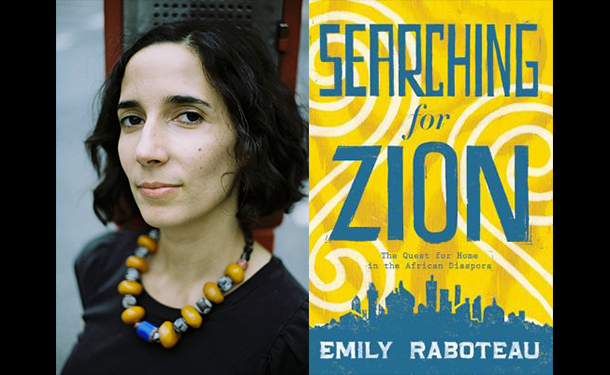Of all the possible suggestions that came to Common Read committee chair Tara Kishbaugh from the Eastern Mennonite University community, one topic bubbled to the surface.
“Race,” said Kishbaugh, a chemistry professor who heads the Intellectual Life Committee. “Cross-cultural understanding. Racism. These topics appeared multiple times and in different suggested books in the months before we made the selection.”
In selecting the year’s Common Read – one book that the university community is encouraged to read, discuss and delve into throughout the coming months, Kishbaugh says: “We always try to choose a book that connects with EMU’s distinct mission and these are topics that link directly to peacebuilding, to cross-cultural engagement and serving and leading in a global context.”
Searching for Zion: the Quest for Home in the African Diaspora (Grove Press, 2013) by Emily Raboteau became this year’s Common Read selection after professor David Evans reviewed her memoir and then reached out to her.
“Once she said she could come to campus, it was an easy decision,” Kishbaugh said. “That creates a real sense of immediacy that is so valuable for our students.”
Raboteau will be on campus Oct. 21 to speak at 10 a.m. chapel in Lehman Auditorium, as well as in a 4 p.m. colloquium at Main Stage Theater in the University Commons. Both events are free and open to the public.
Around the world
The book chronicles Raboteau’s 10 years of travel in Jamaica, Ethiopia, Ghana, and the American South, as she encounters and engages with voices as diverse as Rastafarians and African Hebrew Israelites, Evangelicals, Ethiopian Jews and Katrina transplants from her own family.
Raboteau’s search for Zion leads her right back to where she started, the United States of America, where, Evans asks in his review, “one wonders if the search for Zion is a search for a promised land or a search for self?”
The book was named a best book of 2013 by The Huffington Post and The San Francisco Chronicle. Raboteau is a current finalist for the Hurston/Wright Legacy Award, grand prize winner of the New York Book Festival, and winner of a 2014 American Book Award. Her fiction and essays have been widely published and anthologized. Raboteau resides in New York City and teaches creative writing in Harlem at City College, once known as “the poor man’s Harvard.”
‘Read’ strategy varies
EMU’s strategy related to the Common Read has been different each of its three years, Kishbaugh said. The inaugural book selection for 2013-14 was The Absolutely True Diary of a Part-Time Indian by Sherman Alexie. Last year’s selection was Nicholas Carr’s The Shallows: What the Internet Is Doing to Our Brains, which Kishbaugh said was especially thought-provoking for faculty members thinking about how to teach this new generation of computer-savvy consumers.
This year, all students in Transitions courses – that is, students who are new to the EMU community – are reading “Searching for Zion” and exploring themes of selfhood, race, citizenship and displacement: “how you and your cultural background fit in” or don’t fit in within various contexts and encounters with people who are similar and different, says professor Nancy Heisey, director of the EMU Core curriculum.
“A common read is based on the premise that learning together through our joint comprehension of and engagement with the text invites conversation and valuable cultural connections,” says English professor Vi Dutcher. “Meeting the author of the book helps make the text come alive – in community.”
Students, faculty and staff are welcome at events throughout the school year, including faculty presentations and responses, that provide opportunities to learn from and discuss the book.
